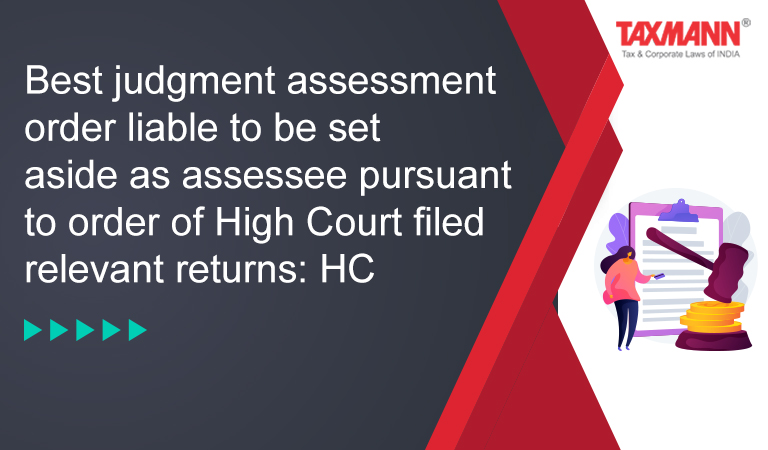Best judgment assessment order liable to be set aside as assessee pursuant to order of High Court filed relevant returns: HC
- Blog|News|GST & Customs|
- 2 Min Read
- By Taxmann
- |
- Last Updated on 11 October, 2021

Case Details: Associate Decor Ltd. v. Assistant Commissioner of Commercial Taxes, Bengaluru - [2021] 130 taxmann.com 497 (Karnataka)
Judiciary and Counsel Details
-
- S. Sunil Dutt Yadav, J.
- K.P. Kumar, Sr. Adv., Ajay Rao and Adith Jahgirdar, Advs. for the Petitioner.
- Hema Kumar AGA for the Respondent.
Facts of the Case
The department had passed best judgment assessment orders under section 62(1) on the assessee and raised tax demand upon it. Pursuant to the best judgment assessment orders, the department attached current accounts of the assessee. The writ petition was filed by the assessee and the High Court ordered for lifting the attachment of current account of the assessee and also held that if the assessee was to file its returns by October 7th, 2018, then attachment in respect of the goods would be released in favour of the assessee.
The assessee filed the returns for within the time granted and the High Court disposed of the matter and dismissed the writ petition ‘as having rendered infructuous’. The department demanded the tax stating that though the attachment and garnishee notices were withdrawn, but the best judgment assessment orders passed were still valid. The assessee filed writ petition against the same.
High Court Held
The Honorable High Court observed that once the returns were filed by the assessee in terms of the order of the High Court, those returns were to be considered as returns in terms of section 62(2) and the best judgment assessment orders passed under section 62(1) would stand withdrawn. Therefore, the department was directed to process the returns filed by the assessee.
Disclaimer: The content/information published on the website is only for general information of the user and shall not be construed as legal advice. While the Taxmann has exercised reasonable efforts to ensure the veracity of information/content published, Taxmann shall be under no liability in any manner whatsoever for incorrect information, if any.

Taxmann Publications has a dedicated in-house Research & Editorial Team. This team consists of a team of Chartered Accountants, Company Secretaries, and Lawyers. This team works under the guidance and supervision of editor-in-chief Mr Rakesh Bhargava.
The Research and Editorial Team is responsible for developing reliable and accurate content for the readers. The team follows the six-sigma approach to achieve the benchmark of zero error in its publications and research platforms. The team ensures that the following publication guidelines are thoroughly followed while developing the content:
- The statutory material is obtained only from the authorized and reliable sources
- All the latest developments in the judicial and legislative fields are covered
- Prepare the analytical write-ups on current, controversial, and important issues to help the readers to understand the concept and its implications
- Every content published by Taxmann is complete, accurate and lucid
- All evidence-based statements are supported with proper reference to Section, Circular No., Notification No. or citations
- The golden rules of grammar, style and consistency are thoroughly followed
- Font and size that’s easy to read and remain consistent across all imprint and digital publications are applied



 CA | CS | CMA
CA | CS | CMA
